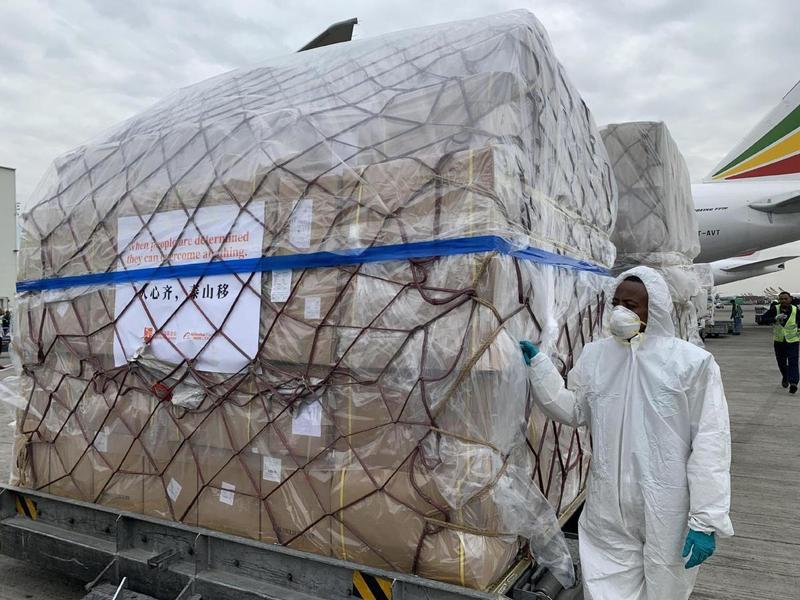 A Staff worker unloads the medical supplies from China at the airport in Addis Ababa, Ethiopia, on March 22, 2020. (PHOTO / XINHUA)
A Staff worker unloads the medical supplies from China at the airport in Addis Ababa, Ethiopia, on March 22, 2020. (PHOTO / XINHUA)
China has taken a range of steps to aid the global fight against the novel coronavirus, a senior National Health Commission official said on Thursday.
Among those measures, it has sent expert teams to hard-hit countries, equipped foreign medical workers with virus-control knowledge and techniques, donated essential medical supplies overseas and established online information-sharing platforms.
China has sent expert teams to hard-hit countries, equipped foreign medical workers with virus-control knowledge and techniques, donated essential medical supplies overseas and established online information-sharing platforms
"The virus is raging rapidly and fiercely across the globe, affecting over 200 countries and regions. The pandemic again sends out a warning that the virus knows no borders and no countries can stay isolated. International collaboration, unity and consolidated efforts are urgently needed," Li Mingzhu, an inspector with the commission's Department of International Cooperation, said at a news conference.
READ MORE: China ready to boost global anti-virus fight
As domestic outbreaks wind down, China has recently dispatched medical assistance teams with experts in public health, clinical treatment, psychological relief and traditional Chinese medicine to countries such as Italy, Serbia, Cambodia, Pakistan and Venezuela, the commission said.
"Medical aid teams are tasked with communicating with local health authorities and experts on the development of epidemic and disease-control experience, launching various forms of training, providing guidance and counseling, and lending a helping hand to overseas Chinese and students studying abroad," he said.
In Serbia, Chinese experts were invited twice to meetings of the nation's epidemic control task force. "Serbia speaks highly of the knowledge and professional skills of Chinese experts and has adopted some of our suggestions," Li said.
Chinese medics in Italy have arranged virtual conferences between Italian hospitals and Chinese health institutions.
ALSO READ: Collaboration key to win global anti-virus fight
As concerns have arisen over African countries' capabilities to cope with the contagion, the commission has also begun mobilizing its medical aid teams there to help.
"There are nearly 1,000 (Chinese) medical workers already stationed in Africa. Since the epidemic broke out, we have asked them to provide needed assistance," Li said. "Altogether, they have rolled out over 250 training or health promotion events, trained over 10,000 people and released more than 800 guidelines in local languages."
As domestic outbreaks wind down, China has recently dispatched medical assistance teams with experts in public health, clinical treatment, psychological relief and traditional Chinese medicine to countries such as Italy, Serbia, Cambodia, Pakistan and Venezuela, the commission said
In Ethiopia, Chinese medical workers helped adjust testing equipment, which made it the second country in Africa to be able to conduct nucleic acid tests, Li said.
"We have received a torrent of gratitude from African countries, who said Chinese experts have contributed lots of valuable experience," he said."We will continue to support African countries, help bolster their capabilities and safeguard global public health."
Li said China has conducted 40 videoconferences with over 100 countries and regions on fighting the virus."We will arrange 20 more such events soon as many foreign countries have asked," Li said.
China has also set up an online "knowledge center" consolidating diagnosis and treatment documents, disease control and technical guidelines. "These guidelines are distilled from our practice and have proved effective. We will share them without reservation," he said.
China also will deepen cooperation in creating drugs and vaccines against the virus, strengthen response systems of countries with weakness in public health, and enhance coordination of epidemic control efforts between countries.


